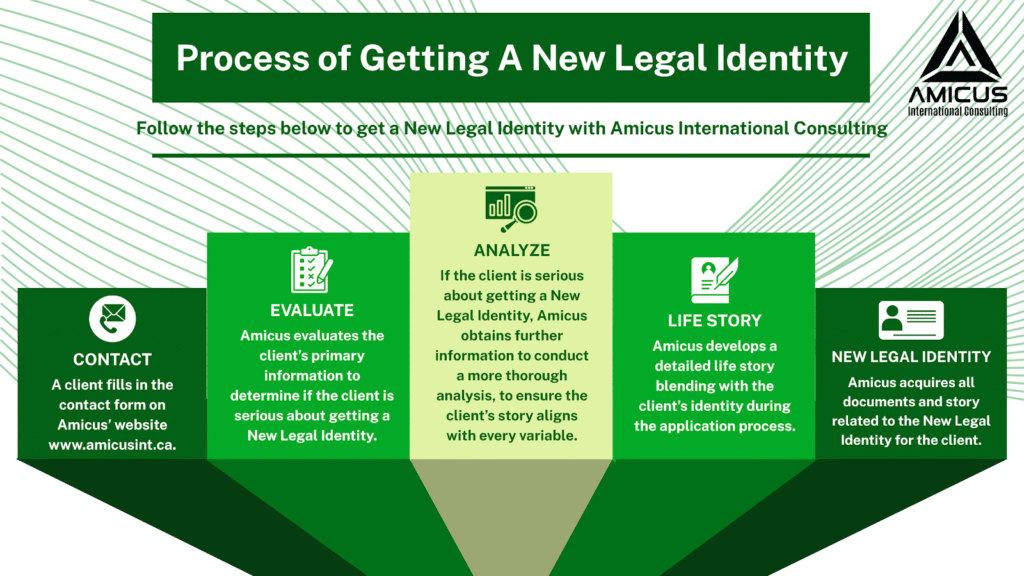VANCOUVER, British Columbia — In today’s hyper-connected world, where digital footprints are permanent and personal data flows across borders in seconds, the concept of identity erasure is no longer science fiction. It is a legal, technical, and emotional process undertaken by thousands each year seeking freedom from persecution, privacy violations, false accusations, and reputational ruin.
Amicus International Consulting, a global authority on legal identity transformation, has released its 2025 report, “The Reality of Identity Erasure,” which sheds light on what it truly takes to disappear from public systems and start over—with real stories, tangible outcomes, and legal pathways that offer protection without deception.
Identity erasure is not about fraud. It is about lawful self-defence. For many, it’s the only viable route to reclaim agency in a world where personal history can be weaponized. This report combines verified case studies, jurisdictional frameworks, and professional insights into how identity erasure works, who it helps, and what risks remain—even when the law is on your side.
Why People Erase Their Identities: Beyond Hiding
There is a profound distinction between evading justice and seeking erasure for survival. Identity erasure is pursued by individuals who no longer feel safe operating under their original identity. Their reasons are varied but legitimate:
- Survivors of domestic abuse or stalking, who are being found, could face danger or death
- Whistleblowers and political dissidents, often targeted by regimes or corporations
- Victims of false media narratives that destroyed reputations irreversibly
- Professionals unjustly disbarred or blocked in their industries
- Individuals persecuted for sexual orientation, religious beliefs, or activism
For these people, identity erasure isn’t a privilege—it’s a necessity.
Case Study: The CFO Who Vanished to Survive
In 2020, a financial executive in Hong Kong exposed embezzlement in his firm. He was named in retaliatory lawsuits and harassed by hired stalkers. Despite the dismissal of charges, online narratives ruined his career. With Amicus’s help, he secured citizenship in Dominica through Investment, legally changed his name, and built a new identity with documents issued under his new profile. Today, he operates a boutique firm in Eastern Europe—safe, solvent, and unknown to those who once tried to ruin him.
Step One: Legal Foundations for Identity Erasure
Amicus begins every case with a legal feasibility assessment. This step evaluates whether the client qualifies under international law for identity restructuring, including:
- Eligibility for legal name change under national laws
- Access to humanitarian visas, asylum, or refugee protections
- Opportunities for expungement or sealing of legal records
- Clean financial provenance and non-involvement in criminal activity
- Jurisdictions with privacy legislation protecting reissued identities
Only clients who meet all legal thresholds are accepted. The goal is not to obscure criminal conduct—it is to eliminate records that no longer serve the interests of justice or public safety.
Step Two: Choosing the Right Jurisdiction to Disappear
Certain countries have become trusted havens for the erasure of legal identities. These nations offer robust civil codes for name changes, sealed records, and non-participation in invasive data-sharing agreements.
Top jurisdictions in 2025 include:
- Paraguay: Offers low-profile permanent residency, court-based name changes, and minimal data exchange
- Georgia: Provides liberal business visas, new ID issuance, and GDPR-style privacy controls
- Uruguay: Welcomes refugees, seals court proceedings, and supports identity reinvention
- Dominica: Supports citizenship-by-investment and name reissuance with legal declarations
- Panama: Allows public deed name changes and issues new foundational documents
Choosing the correct country determines the viability and permanence of the erasure process.
Case Study: The Journalist Reborn in Georgia
After being targeted by her government for investigative reporting, a Middle Eastern journalist fled to Europe. She eventually relocated to Georgia, where she changed her name through the civil registry, obtained new biometric documents, and started teaching under her new legal identity. Amicus provided coordination with local counsel to ensure that her past identity was disconnected across travel, banking, and employment systems.
Step Three: Name Change and Document Synchronization
Once the legal name change is complete, synchronization is critical. Inconsistent documents raise flags. Amicus guides clients through:
- Civil registry updates to reflect the new name
- National ID and passport reissuance
- Driver’s licenses, tax ID, and birth certificate (when allowed) under the new identity
- Police clearance and certificate of reasonable conduct requests under the new name
- Apostilles and notarized affidavits for international use

This phase ensures that the new identity is functional—not only legal on paper, but usable in the real world.
Step Four: Severing Digital Connections to the Past
Even with new documentation, remnants of the past linger online. Amicus works with digital forensic experts to:
- Scrub social media metadata and archived content
- De-index search results using GDPR and CCPA laws
- Remove news articles, blogs, and user forums through takedowns or negotiation
- Delete domain records and associated WHOIS data
- Clean metadata from personal photos, emails, and PDFs that may have geolocation or device history
Actual erasure involves both the legal identity and its digital echo.
Case Study: The Medical Professional Who Reclaimed Her Career
A U.K. physician falsely accused of malpractice found herself unable to work due to the spread of negative press—even after clearing her name in court. Amicus helped her emigrate to Uruguay, change her name legally, and obtain new licensing documents through a regulatory equivalence program. Her online profile was rebuilt under her new identity, allowing her to return to practice in South America with zero exposure to her former life.
Step Five: Establishing Financial Integrity Under the New Identity
Banks and financial institutions require stringent identity verification. Amicus assists clients in:
- Opening accounts in privacy-forward jurisdictions
- Creating offshore companies to serve as ownership shields
- Securing tax ID numbers under the new name
- Disconnecting old credit records and initiating new credit profiles
- Legal fund transfers between entities to maintain compliance with tax laws
Preferred jurisdictions include Armenia, Georgia, Belize, and Nevis—all of which offer legal but discreet financial infrastructures for second-chance identities.
Step Six: Psychological Support and Social Reintegration
Erasing an identity is as emotionally taxing as it is technically complex. Clients are assigned psychological counsellors and identity integration specialists to help with:
- Adjusting to a new name and backstory
- Creating credible life narratives for social settings
- Managing emotional detachment from the past
- Establishing new routines, communities, and social roles
- Navigating relationships while maintaining discretion
Many clients report a sense of peace and empowerment—but only after considerable adjustment and planning.
Case Study: The Abuse Survivor Who Rebuilt From the Ashes
A Canadian woman fled an abusive relationship with a known cyberstalker. After being tracked through digital breadcrumbs and public court filings, she collaborated with Amicus to secure a humanitarian visa and resettle in Costa Rica. Her identity was legally changed, her devices replaced, and her digital presence scrubbed. Today, she operates a yoga studio and shares no traceable connection to the identity that once left her vulnerable.
The Risks and Limitations of Identity Erasure
While legal identity erasure is effective, it has limits:
- Governments may still retain sealed or restricted access to former records
- International arrest warrants (e.g., Interpol Red Notices) cannot be erased without withdrawal
- Travel to the original country may trigger biometric flags
- Some visa regimes require disclosure of former identities
- Dual identities may be illegal in certain countries and must be managed transparently
Amicus advises clients on navigating these complexities with full legal compliance.
Expert Commentary: Legal, Not Invisible
A privacy attorney affiliated with Amicus states, “We don’t erase people—we restore them legally. The law has provisions for reinvention, for protection, and rebuilding. Identity erasure is simply the modern expression of those rights. Done right, it’s not erasure. It’s rebirth.”
He adds, “Our clients are teachers, engineers, activists, artists. Not criminals. They don’t want to hide. They want to be safe, and to be free.”
Legal Tools Supporting Identity Erasure in 2025
- GDPR Article 17 (‘Right to Erasure’): Applies across the EU and to platforms serving EU citizens
- California Consumer Privacy Act (CCPA): Mandates deletion upon request by residents
- Name Change Acts: In countries like Ireland, Belize, and Georgia, allow name changes with sealed records
- Digital Rights Foundations: Legal NGOs are now pushing for global standards on data deletion
- Interpol Delisting Procedures: Red Notice subjects can now appeal for delisting under new transparency reforms
How Amicus International Consulting Assists With Identity Erasure
- Legal feasibility audits and client eligibility screening
- Jurisdiction selection based on privacy, residency, and identity laws
- Legal name change filing and court representation
- Civil registry synchronization and full identity document reissuance
- Bank account setup, offshore structuring, and KYC compliance
- Metadata removal, online content suppression, and digital rebranding
- Psychological support and post-transition life coaching
- Travel strategy and immigration documentation planning
Only clients with verifiable, legitimate reasons are accepted. Amicus does not assist fugitives, those seeking to evade child support or alimony, or anyone under active criminal investigation.
Conclusion: Erasure Is Not the End — It’s the Beginning
To erase a life once defined by trauma, misrepresentation, or risk is not an act of deception. It is an act of courage. When done legally, ethically, and strategically, identity erasure offers a doorway into a future unshackled by the past.
Amicus International Consulting provides not just tools, but trust. It offers more than new documents — it gives new lives. And in 2025, as surveillance grows and privacy shrinks, the ability to start again may be the most precious right of all.
Contact Information
Phone: +1 (604) 200-5402
Email: info@amicusint.ca
Website: www.amicusint.ca



